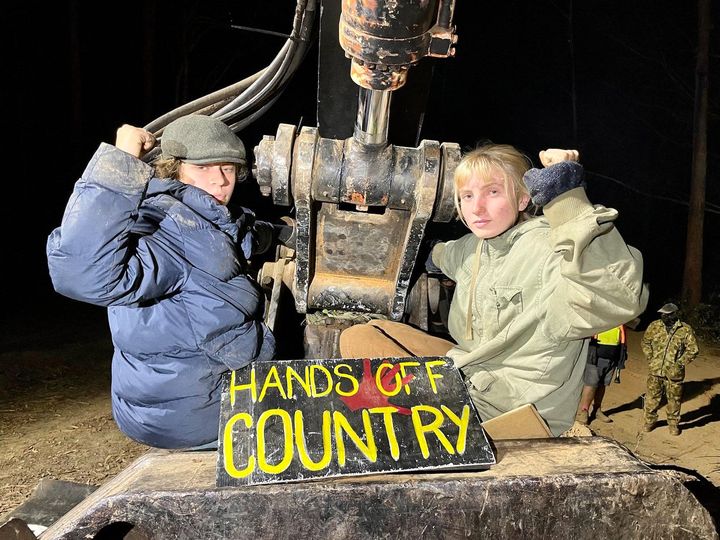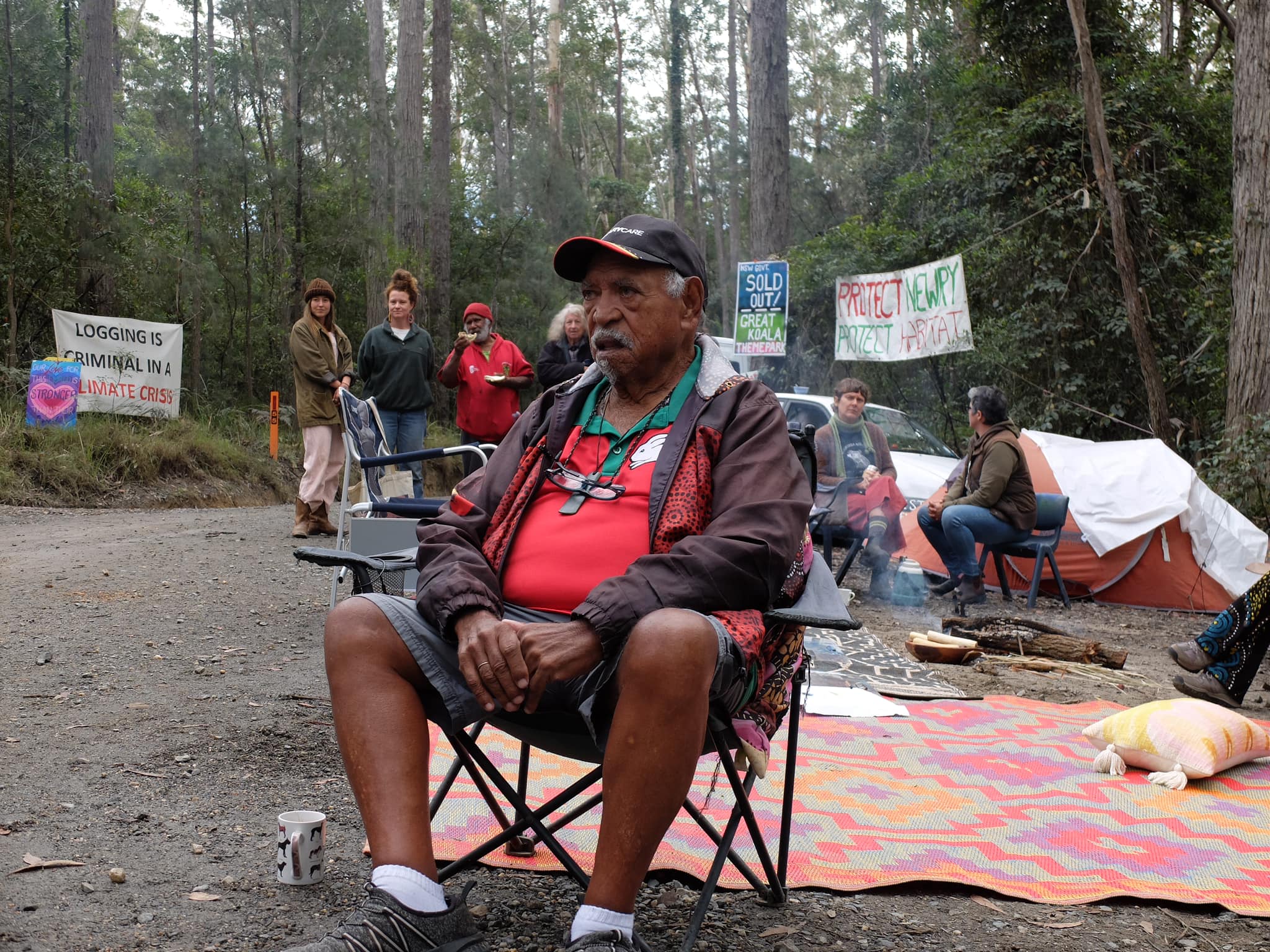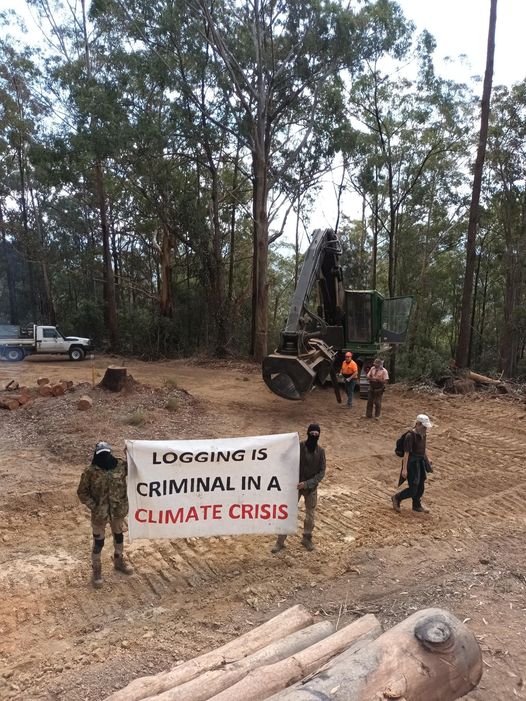The battle to stop the destruction in Australia of critical koala habitats in state forests in Northern NSW has escalated in recent weeks. Wendy Bacon reports on the campaign from daring lock-ons and vigils in the depth of forests to rallies, parliament and courts in Sydney which has led to a halt to logging in Newry State Forest.
SPECIAL REPORT: By Wendy Bacon
Back in Feburary this year, campaigners celebrated as the then shadow Environmental Minister Penny Sharpe announced Labor’s support for a Great Koala National Park (GKNP), stretching along the Mid-North coast from Kempsey to Coffs Harbour.
The purpose of the park, which was first proposed more than a decade ago, is to protect critical habit for the koala and other threatened species.
Koala numbers in NSW plummeted by more than half between 2000 and 2020 due to logging, land clearing, drought and devastating bushfires. A NSW Parliamentary Inquiry in 2020 heard scientific evidence that koalas could be extinct by 2050 unless there are dramatic changes.
NSW is the only mainland state not to have a plan to stop logging of native forests, essential koala habitats.
Hopes raised by Labor’s narrow election win in March this year were quickly dashed. Hope has now turned to anger with 200 people marching in protest in the mid-north NSW city of Coffs Harbour earlier this month and nation-wide rallies.
In Sydney, hundreds marched through the streets of Marrickville to a protest outside Prime Minister Anthony Albanese’s electoral office.
NSW Forestry Corporation steps up logging
When she received a petition calling for a moratorium on logging within the GKNP in June, Minister for Environment Penny Sharpe reiterated her commitment to the Park but confirmed that logging would not stop.
Instead the government-owned, NSW Forestry Corporation (NSWFC) has stepped up its logging inside the proposed GKNP, including in areas containing long-lasting koala hubs, carting off huge tree trunks and leaving devastated land in its wake. These operations are losing millions each year.
The campaign consists of a network of local community groups, such as the Friends of Orara East Forest, some of which conduct weekly vigils; the Belligen Activist Network and the Knitting Nannas, as well as larger environmental groups such as the National Parks Association.
It is supported by the NSW Greens, Animal Justice and some Independent MPs including MP for Sydney Alex Greenwich. Further north, the North East Forest Alliance has taken legal action to stop the NSWFC logging 77 percent of the Braemar forest, part of the proposed Sandy Creek National Park where koalas survive despite long standing koala communities being reduced by 70 percent in the 2019/2020 bush fires.
On June 28, a broad-based group of MPs and NGOS advocating for the park held a press conference calling on politicians across all parties to support a moratorium on the ongoing destruction of the GKNP and immediately start to work on transition plans for timber workers and development of the Park, including with local First Nations people.
But Minister Sharpe reiterated her intention to allow logging to continue.
A few days later, logging began in the Orara East and Boambee Forests, both of which are inside the Great Koala National Park. Vigils and petitions were clearly not working.
Civil disobedience begins
On July 7, three HSC students on school holidays locked on to heavy machinery and a full barrel of cement in Orara East Forest. At the same time in Boambee Forest, two Knitting Nannas locked onto heavy machinery. Another protester occupied a tree. In all, logging was delayed by 10 hours.
Seventeen-year-old Mason said: “I’m here on behalf of myself and my 14-year-old brother. The rate at which our government is auctioning off natural forests is frightening, and I feel powerless to do anything about it.
“We’ve tried protesting, and we can’t vote, which is why we feel driven to take this action against these machines ripping our trees down. The government can stop this and we just need them to take notice.”
The three students were arrested but released from custody with cautions and no charges laid.
On the same day, two Knitting Nannas Christine Degan and Susan Doyle were arrested in the Boambee State Park. Both are veterans of vigils and protests aimed at stopping logging and for action on climate change.

In desperation, they took a further step. They slept overnight in a home near the perimeter of the State Park.
Before day break, Degan and Doyle and supporters walked up a steep hill, using torches to find their way through the bush to the logging camp. There they were met by an angry security guard who burst into an aggressive tirade, accusing them of being terrorists.
While two supporters calmed him down, the two women were locked onto equipment. There they sat in two small beach chairs in drizzling rain and cold for eight hours until the NSW police arrived and arrested them.

The two friends were released on condition that they did not contact each other, except through a lawyer, or go near any forests were logging was underway.
Earlier this month, they were each fined a total of $500 for entering and refusing to leave a forest.
Battle moves to Newry Forest
A vigil camp is now in its third week in the Upper reaches of the Kalang River where other sites have recently been made “active” for logging.
Nearer the coast, the the battle front has moved to the Newry Forest near Belligen. For nine months in 2021, the community had joined the local Gumbaynggir elders in a blockade that successfully delay logging operations.
Although Newry is a core part of the GKNP, the NSWFC approved 2500 hectares of the forest for logging in May this year. In July, the listing went from “approved” to “active,” leading the Bellingen action group to organise a workshop to upgrade their direct action tactics.
On July 31, local Gumbaynggirr Elders, Traditional Custodians and supporters established a peaceful protest camp on sacred land within the forest. They were met with armed police and steel gates preventing the public from entering the forest.
A Gumbarnggirr spokesperson told the National Indigenous Times that the NSW Forestry Corporation (NSWFC) was endangering koala and possum gliders that are their totem animals.
“The values of Newry to the Gumbaynggirr people are precious, priceless and absolutely irreplaceable. …There is a desperate need for these appalling industrial logging operations to be stopped or we simply won’t have koalas left and priceless and irreplaceable Gumbaynggirr values and cultural heritage will be destroyed.”

Gumbaynggirr elder arrested after locking on
On the second day of logging, two younger protesters locked onto machinery. On the third day, Wilkarr Kurikuta, a Ngemba, Wangan and Jangalingou man, locked-on to a harvester.
“I’m here for my old people and my sister, a proud Gumbaynggirr woman, to exercise my sovereign right to protect country,” he said.
He told the NSW government that it should expect resistance until an end is put to the destruction of his people’s land and waters. He was violently removed, charged and held overnight in a cell.
The next day, two more young people locked onto industrial logging machinery in Newry Forest, again halting logging. They were arrested, charged and released. Logging had so far been disrupted on six days.
On August 2, Greens MP Sue Higginson moved a motion in the NSW Legislative Council to confirm the NSW government’s intention to protect critical koala habitat, noting that the Newry State Forest was “identified for protection in 2017 as having three koala hubs” and that a three-day survey had found five threatened plant species, evidence of koalas and high quality habitat for threatened koalas, the Glossy Black Cockatoo and Greater Glider.
She described the “industrial scale logging operation” as happening under “martial law”.

“The community on the front line are not doing this because it is fun or because they want to, or because they dislike forestry workers or police,” she told Parliament.
“They are doing it as an act of hope in the democratic process in which they believe — the genuine hope that they will be seen and heard and that their actions will lead to political outcomes that protect this forest, which the government has promised to protect but is currently destroying.”
Labor opposed the motion with the Minister for the Environment Sharpe moving amendments which removed any reference to the factual core of the motion described above. Her amendments were passed with Liberal National Party support.
A reduced anodyne motion recording commitment to protect the koala was then passed.
In her response Penny Sharpe referred to “internal work” being done to proceed with the Park. She said she was working closely with the Minister for Forestry Tara Moriarty.
This will further concern forest campaigners because in Moriarty’s speech in support of Sharpe’s amendments, she supported the current logging operations as being done in line with sustainable ecologically sound forest management, with the NSW Environmental Protection Authority ensuring compliance with all policies.
This is the very issue that is being contested by the movement to save the forests. It suggests that Moriarty may not accept the findings of a recent NSW Auditor-General’s report which found that both the NSW Forest Corporation and the NSW Environmental Protection Authority were insufficiently resourced, trained and empowered to enforce compliance and that NSWFC’s voluntary efforts did not extend to satisfactorily ensuring contractors do not breach regulations and policies.
This issue is already before the courts. The North Eastern Alliance, which has previously taken successful court actions during the 34 year period it has been campaigning to protect forests, is arguing that the NSW Land and Environment Court should set aside approvals to log sections of the Braemar and Myrtle Forests further north at the Sandy Creek State Park which is also a proposed national park in the Richmond Valley.
The NSWFC has agreed to halt logging in these forests which are home to koalas and more than 23 threatened species, until the case is decided. The Alliance will be represented by the Environmental Defenders’ Office.
Alliance President Dailan Pugh, who has 44 years experience in protecting forests, said that “Myrtle and Braemar State forests are both identified as Nationally Important Koala Areas that were badly burnt in the 2019/20 wildfires, killing many of their resident koalas.
“Despite this, recent surveys have proved that most patches of preferred koala feed trees are still being utilised by Koalas. Logging of more than 75% of the larger feed trees … that koalas need to rebuild their numbers will be devastating for populations already severely impacted by the fires.”

The Environmental Defenders’ Office is arguing that the logging operations are unlawful for several reasons: because the operations are not ecologically sustainable, because Forestry Corp failed to consider whether they would be ecologically sustainable, and because the proposed use of “voluntary conditions” is in breach of the logging rules.
NEFA is asking the court to declare the logging approvals invalid and to restrain NSWFC from conducting the operations.
Pugh said: “We have been asking the NSW Government for independent pre-logging surveys on State forests to identify and protect core Koala habitat and climate change refugia, and protection of Preferred Koala Feed Trees (select species >30 cm diameter) in linking habitat. Our requests are falling on deaf ears, we hope this will make them listen.”
While Labor politicians insist that the logging is consistent with protecting biodiversity, the situation looks different to campaigners on the ground. Degan describes seeing crushed casuarinas which provide habitat for the Glossy Black Cockatoo when she visited the Newry Forest for the first time in four weeks.
“It’s just a vast area with trash that’s a metre deep, that no footed animal can get across. I couldn’t get across and I’d break an ankle or shoulder falling over. There’s no way that animals on foot could traverse that debris that’s left behind. It may be regrowth native forest but after 50 years it provides substantial decent habitat.”
Down in Hobart, another forest activist Collette Hamson is spending three months in prison because she broke conditions of a suspended sentence. Before she went to prison she said:
“The reason I commit these offences [is] because I am terrified of the worsening climate crisis. I am not a menace to society, yet here I am facing a jail term . . . I am not giving a finger to the entire judicial system, I am standing up for the forests, for takayna, a safer planet and if that makes me a dangerous criminal then I think we are going to need bigger prisons.”
Labor plans lengthy consultation
While the Minister for Environment Penny Sharpe may be able to remove any mention of protests in a parliamentary motion, it is another thing to deal with the wave of civil disobedience that is likely to continue until native forest logging is halted. Sharpe says that A$80 million has been set aside for GKNP and planning is underway.
City Hub asked the Department of Environment to confirm that no consultation was yet underway and on what date one consultation would begin.
A National Parks and Wildlife Service spokesperson replied, stating that development of the park “will be informed by expert scientific advice, an independent economic assessment of impacts on jobs and the local community, and an inclusive consultation process with stakeholdes . . .
“Consultation with stakeholders will occur in the future, with specific timings still to be determined.”
This lengthy process could take most of NSW Labor’s term in government ending in 2027. Unless logging is halted while planning occurs, the proposed National Park along with threatened species it is supposed to protect could be decimated before it arrives.
Wendy Bacon was previously professor of journalism at the University of Technology Sydney (UTS) and supported the Greens in this year’s NSW election. This article was first published by CityHub on August 15 and is republished with permission. Wendy Bacon’s investigative journalism blog.
Article by AsiaPacificReport.nz








